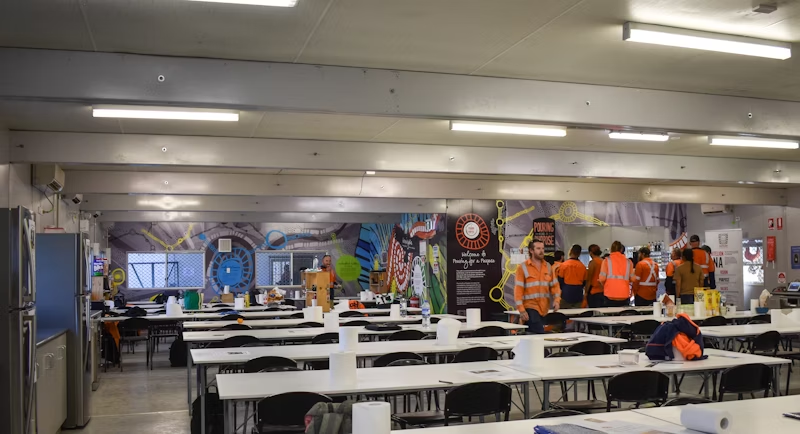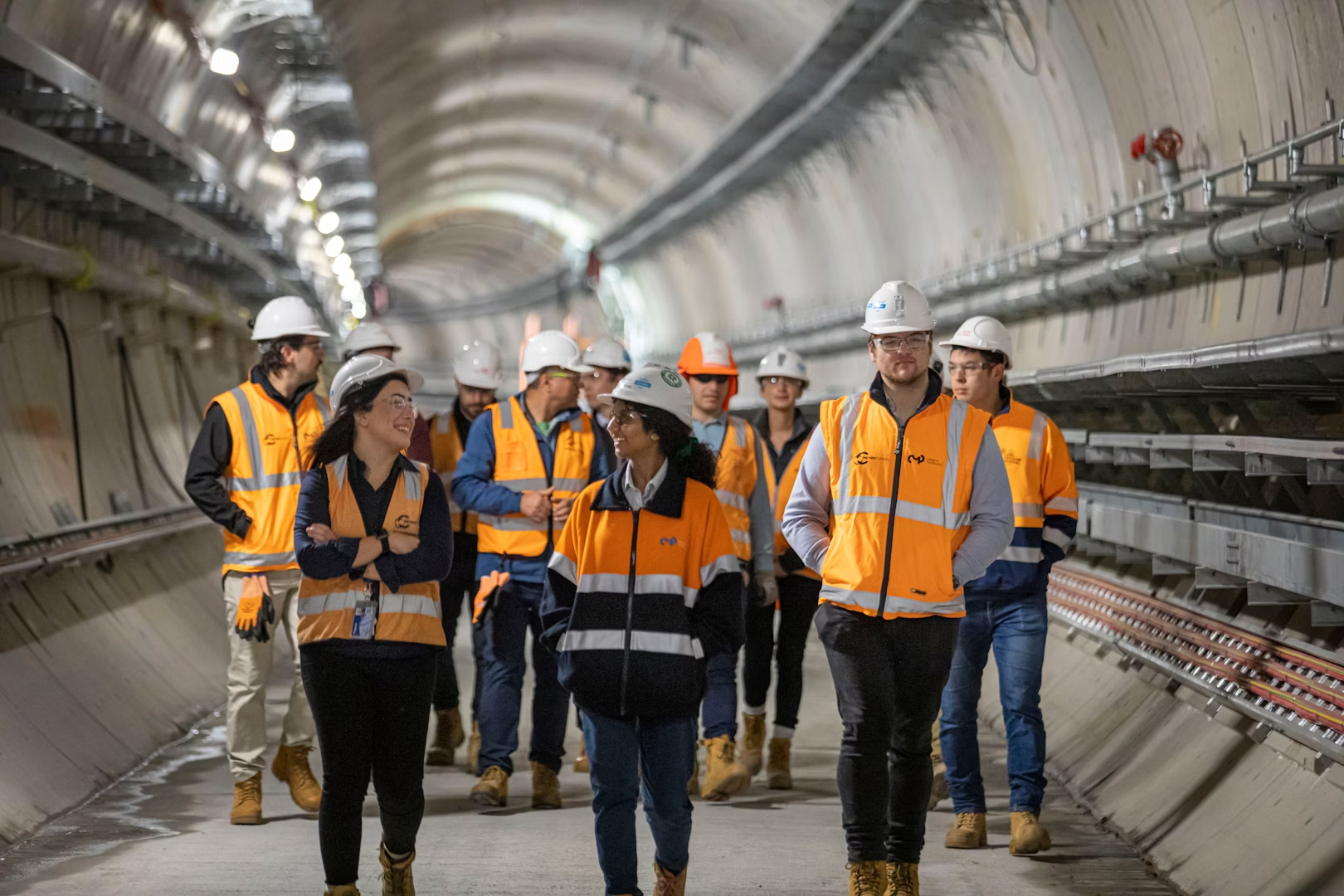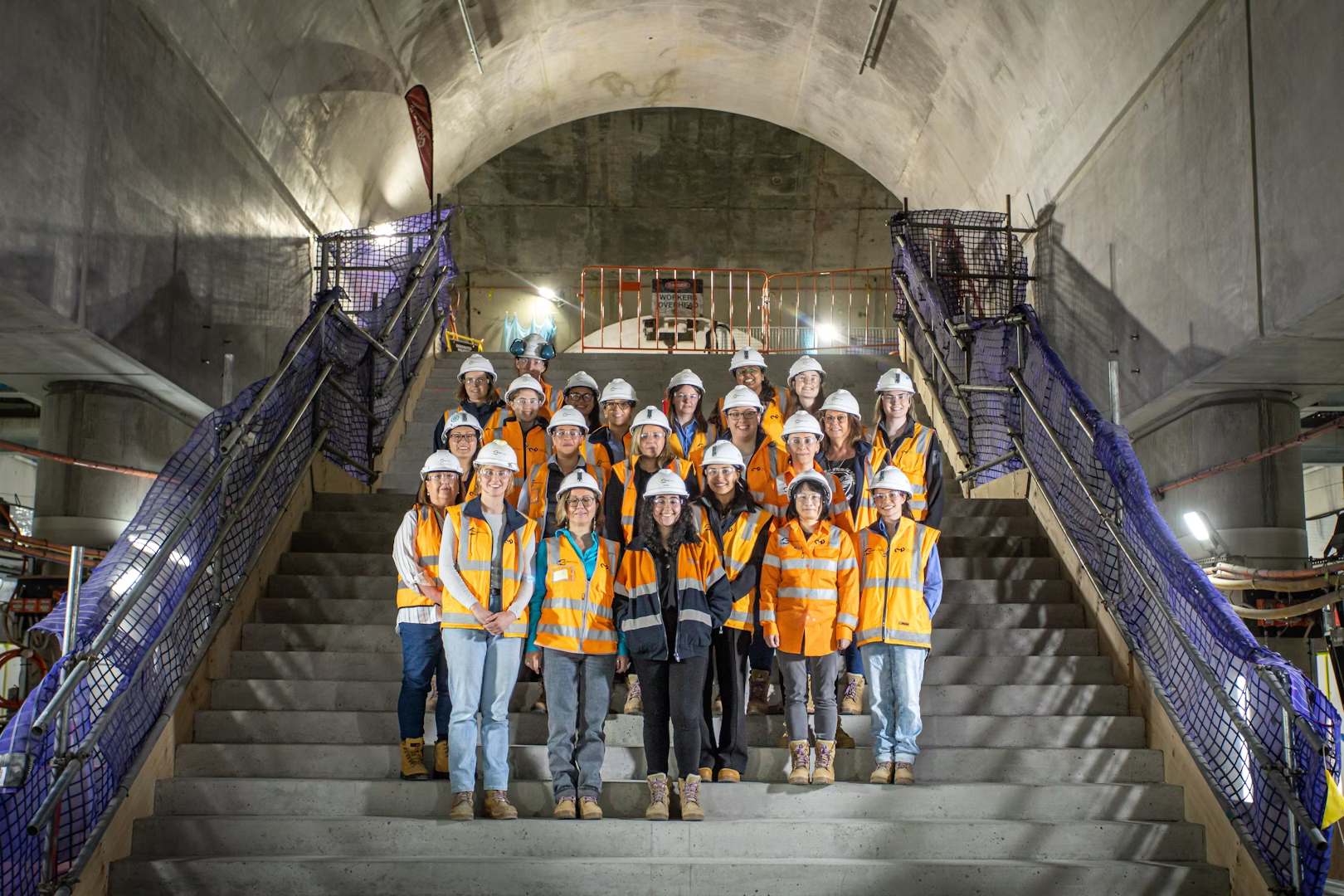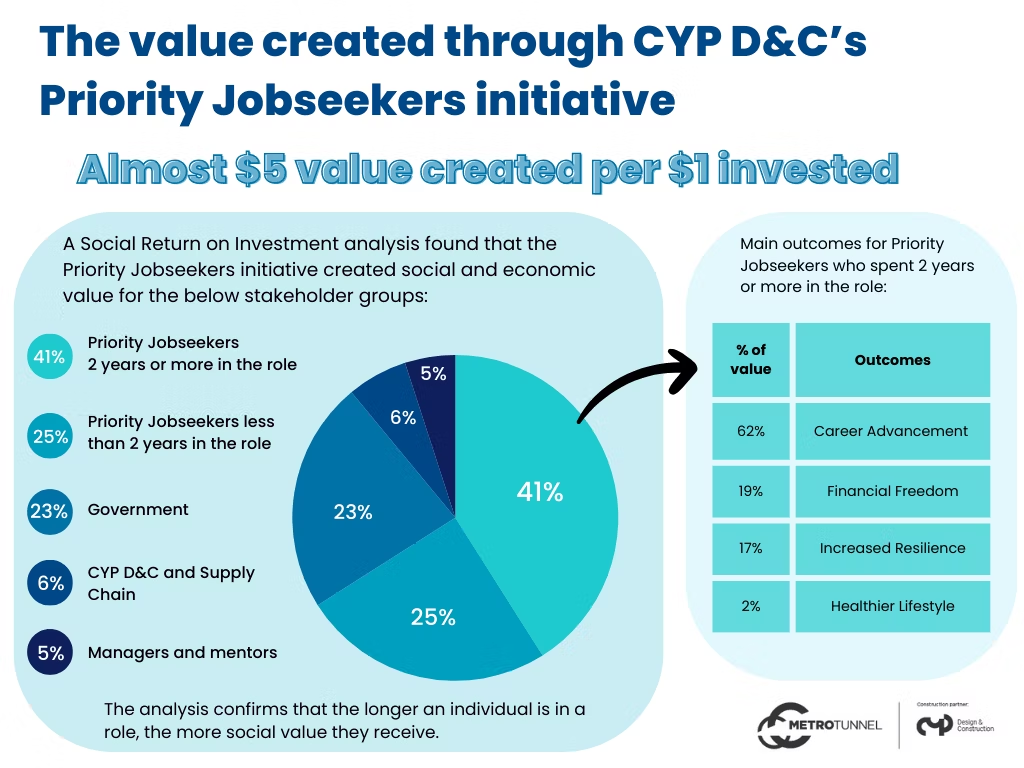Metro Tunnel Project – Economic Outcomes
Social sustainability initiatives are some of the hardest to measure the full return of investment, with detailed measurement of outcomes typically not within the remit of infrastructure projects. In delivering the Metro Tunnel Project’s Tunnels and Stations package of works, CYP Design & Construction sought to change that by undertaking six Social Return on Investment (SROI) studies over five years to verify the value of three priority social sustainability initiatives, with the three evaluative SROI analyses conducted in 2023-24. These detailed studies have undergone third-party independent assurance by Social Value International, the global network for social value and impact measurement that promotes the use and development of the SROI methodology. They were used by CYP Design & Construction to inform the evolving design and implementation of the initiatives and to inform government and the consortium about how projects can create social value alongside meeting the critical infrastructure need.
Describe WHAT you have done and HOW you have done it. Please provide a summary of your initiative, innovation, or approach.
Social sustainability initiatives are some of the hardest to measure the full return of investment. Reporting in the context of infrastructure projects tends to focus on outputs rather than detailed measurement of outcomes for people and communities.
In delivering the Metro Tunnel Project’s Tunnels and Stations package of works, CYP Design & Construction (CYP D&C) sought to change that by undertaking independently verified Social Return on Investment (SROI) studies to evaluate the value of three priority social sustainability initiatives:
- Employment of priority jobseekers from 2019 - 2024
- Workforce development for Trainees, Cadets and Apprentices from 2019 - 2024
- Social procurement from 2019 – 2024.
These studies comprised three forecast SROI analyses conducted in 2019 and three evaluative SROI analyses conducted in 2023-24. All six of these detailed studies have undergone third-party independent assurance by Social Value International, the global network for social value and impact measurement that promotes the use and development of the SROI methodology.
Social Value International commended CYP D&C’s approach and consider that it is the first time an assured forecast plus evaluation SROI has been assured for the infrastructure sector at the scale of CYP D&C’s activities.
CYP D&C, in conjunction with our specialist partners Think Impact, has gone ‘over and above’ a standard practice measurement approach. We have actively sought to measure the legacy value of these investments and initiatives to deeply understand the social return on investment and value created for individuals, community, CYP D&C, industry and government stakeholders.
By conducting forecast analyses we had a better understanding of the value that stakeholders hoped for and anticipated, and how CYP D&C could design the initiatives to create the most social value for individuals, community, CYP D&C, industry and government stakeholders.
The SROI approach draws on established methodologies in economics, accounting and social research. It is underpinned by eight principles which ensure that the analysis understands the changes that take place and the additional value that has occurred through the activities being delivered.
SROI analysis compares the investments required to deliver the activities, with the value of the outcomes experienced by all beneficiary stakeholders.
Social Value International has praised CYP D&C’s approach and stated that we have exceeded standard practice by incorporating stakeholder interviews and interactions across all benefit receivers, to validate the investigations and findings claimed. This included interviews with individual participants in the programs offered by CYP D&C, where possible including their families, government representatives, supply chain partners, industry representatives and CYP D&C personnel involved.
Over 400 people provided input to the research through focus groups, surveys and interviews.
Extensive research was undertaken alongside the thorough stakeholder interview process to determine and validate of value findings. The comprehensive analysis and reporting were submitted to Social Value International for third-party assurance. The first three (Forecast) submissions were assured in 2019. The final three (Evaluative) submissions were assured in 2024.
What were the OUTCOMES and how were those outcomes shared?
This initiative undertaken by CYP D&C achieved significant outcomes in social return on investment (SROI).
The SROI studies conducted over five years validated the positive impact of three priority social sustainability initiatives: employment of priority jobseekers, workforce development for trainees, cadets, and apprentices, and social procurement. These initiatives demonstrated a net positive return on investment, with the most significant returns attributed to the Priority Jobseeker programs, followed by Social Procurement activities, and then the Traineeships, Apprenticeships, and Cadets programs. All SROIs returned a net positive return on investment (>$1 value per $1 spend).
By conducting the forecast analyses, CYP D&C were able to deeply understand, from a stakeholder perspective, what was changing for them in their lives and what was most impactful. This informed the ongoing design and implementation of the initiatives being delivered and prompted us to make several changes to maximise the Project’s impact, adjust initiatives, and create valuable lessons for the infrastructure and social value sectors.
The independent assurance of the SROI research process and outcomes by Social Value International provided robust validation of the stakeholder outcomes. This assurance confirmed the positive impact on stakeholders’ livelihoods, and their social and economic situations. The research produced compelling evidence and powerful stories of personal impact, raising awareness and understanding of the benefits of these initiatives within the CYP D&C workforce and beyond.
Internally, the outcomes of the SROI research were used to demonstrate the merits of these programs to various teams within CYP D&C, including human resources, procurement, commercial, and site managers. The initiatives being researched were not well understood by the CYP D&C workforce and staff beyond the core project teams implementing them. Creating employment opportunities for people who have experienced barriers to employment and social procurement wase not standard practice. An outcome of this research was raising awareness and understanding of the benefits of initiatives of this nature. This helped in engaging these teams to deliver similar initiatives at a larger scale. The parent companies of CYP D&C have also taken these lessons to future infrastructure projects, ensuring the continuation of these beneficial practices.
The Project client, Metro Tunnel Project Office (MTPO), has been involved throughout the conduct of the research. It has helped their understanding of how to incorporate social sustainability targets into infrastructure projects and how initiatives need to be delivered to maximise positive impact. The learnings from the Forecast SROI have been shared with other project delivery agencies within the Victorian Government, influencing future projects and policies.
The lessons gained for the infrastructure sector include:
- The value of investing upfront in social procurement initiatives and transitioning them to business as usual.
- The benefits of maintaining focus on priority jobseekers throughout a five-year initiative and the positive outcomes for employees who maintain more than two years in work.
- The importance of investing in solid mentoring for cadets and trainees.
The social value sector benefited from the unprecedented five-year study, which provided insights into the benefits and challenges of conducting forecast and evaluative analyses on the same initiatives. These findings have been shared with the social value measurement community of practice, contributing to the broader understanding and development of SROI methodologies.
The results of the forecast analyses, the process for conducting large-scale social impact measurement, and the lessons learned have been presented to the social impact sector at a webinar co-hosted by CYP D&C and the Social Impact Measurement Network Australia. This event attracted representatives from the infrastructure sector, keen to learn how to maximize social impact through infrastructure projects. CYP D&C and Think Impact are committed to amplifying these lessons by sharing and presenting the recent Evaluative SROI findings with MTPO and other government agencies. Social Value International has also expressed interest in promoting this work to their international audience.
The initiative by CYP D&C has set a new standard for measuring social value in infrastructure projects. The validated outcomes and lessons learned have not only demonstrated the positive impact on stakeholders but have also provided valuable insights for future projects and policies. This initiative has significantly contributed to the understanding and implementation of social sustainability initiatives, ensuring that social value is an integral part of sustainable development in the infrastructure sector.
Describe WHO benefited from your initiative, innovation, or approach?
The ultimate beneficiaries of CYP D&Cs innovation and rigour in social return on investment analysis will be future priority jobseekers, trainees, cadets, social enterprises and Aboriginal-owned businesses.
Stakeholders shared their life-changing experiences due to these initiatives:
“I used to get up at 10am. Now I can support my family financially, they can rely on me.” – Cadet
“My health has improved since I’ve been here. I work hard but I’m more energetic and I feel more connected.” – Cadet
“[I am now] able to rent a house instead of living in a caravan.” – Priority jobseeker
“Confidence and networking are the most significant changes for me. If I look at myself 5 years ago and now, there was a huge transition from me in 2017 to me now.” – Priority jobseeker
“We were a low income family. Now I have a job in CYP, financially I am more stable now.” – Priority jobseeker
“Financial stability is valuable; I don’t need to worry about food. That’s been fantastic”. – Priority jobseeker
“I would say, probably the growth that I’ve had with leadership skills, empathy, EQ skill, I’m able to empathise a lot more with younger people.” – CYP D&C manager/mentor
“Thank you for everything, it [this job] has literally saved my life.” – Social enterprise employee
“This role has given me the second chance I so desperately needed.” – Social enterprise employee
Externally verified research demonstrated that employment of priority jobseekers, workforce development, and social procurement lead to significant outcomes, encouraging continued investment from industry, government organizations, and contractors. Internally, this measurement approach helped stakeholders understand the importance of these initiatives by integrating stakeholders’ stories with quantitative data, bringing the story of change to life.
By conducting a forecast SROI on the three initiatives and then following up with three evaluative SROIs we were able to draw out insights that other research is not able to, such as the impact of refocusing training initiatives on the most impactful elements, the difference between having a dedicated social procurement arm versus integrating it into business as usual, and the effects of changing targets or focusing on those experiencing greater levels of disadvantage.
The social impact measurement community benefited from this unprecedented five-year study, which also enabled three practitioners to obtain Accredited Practitioner status through Social Value International, significantly uplifting the social value community in Australia and internationally.
What LEGACY and UN SDG CONTRIBUTION was achieved?
The SROI studies conducted by CYP D&C have left a significant legacy and contributed to multiple United Nations Sustainable Development Goals (UN SDGs). The legacy and UN SDG contributions achieved through the outcomes and SROI evaluation of the three key social sustainability initiatives are profound and multifaceted.
The legacy of CYP D&C’s SROI studies is rooted in their pioneering approach to measuring social value in infrastructure projects. By conducting both forecast and evaluative SROI analyses, CYP D&C has set a new standard for social impact measurement. This approach has provided valuable insights into how infrastructure projects can create lasting social value, influencing future projects and policies:
- Enhanced Understanding of Social Value: The SROI studies have deepened the understanding of how social initiatives can create value for individuals, communities, and stakeholders. This knowledge is crucial for designing and implementing effective social sustainability initiatives in future infrastructure projects.
- Influence on Policy and Practice: The findings from the SROI studies have informed government and industry stakeholders about the benefits of social sustainability initiatives. The outcomes of this work will be published and made available to government and other industry players. This has the potential to shape policies and practices, ensuring that social value is considered in the planning and execution of infrastructure projects.
- Capacity Building: The project has contributed to the professional development of social impact practitioners. Three practitioners obtained their Accredited Practitioner status through Social Value International, enhancing the capacity of the social value community in Australia and internationally.
- Stakeholder Engagement: The extensive stakeholder engagement process, involving over 400 individuals, has highlighted the importance of involving beneficiaries in the evaluation of social initiatives. This participatory approach ensures that the voices of those impacted are heard and considered in decision-making processes.
The SROI studies have made significant contributions to several UN SDGs, demonstrating the alignment of CYP D&C’s initiatives with global sustainability goals:
- Good Health and Well-being (SDG 3): Employment and workforce development initiatives have positively impacted the mental and physical health of participants, contributing to overall well-being.
- Quality Education (SDG 4): Workforce development programs have provided trainees, cadets, and apprentices with relevant skills and education, enhancing their employability and career prospects.
- Decent Work and Economic Growth (SDG 8): The initiatives have created decent work opportunities and promoted economic growth by integrating priority jobseekers into the workforce and supporting social enterprises.
- Industry, Innovation, and Infrastructure (SDG 9): The innovative approach to measuring social value in infrastructure projects has set a benchmark for the industry, promoting sustainable and inclusive infrastructure development.
- Reduced Inequalities (SDG 10): The focus on employing priority jobseekers and supporting social enterprises has helped reduce inequalities by providing opportunities to disadvantaged groups.
- Sustainable Cities and Communities (SDG 11): The social procurement initiatives have supported the development of sustainable communities by fostering local businesses and creating inclusive economic opportunities.
- Peace, Justice, and Strong Institutions (SDG 16): The transparent and participatory approach to SROI studies has promoted strong institutions by ensuring accountability and inclusivity in the evaluation process.
- Partnerships for the Goals (SDG 17): The collaboration with Social Value International and other stakeholders has demonstrated the power of partnerships in achieving sustainable development goals.
In summary, the SROI studies conducted by CYP D&C have not only provided a robust evaluation of social sustainability initiatives but have also created a lasting legacy and contributed significantly to the achievement of multiple UN SDGs. These efforts have set a precedent for future infrastructure projects, ensuring that social value is an integral part of sustainable development.





